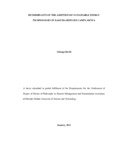Please use this identifier to cite or link to this item:
http://ir-library.mmust.ac.ke:8080/xmlui/handle/123456789/1712| Title: | DETERMINANTS OF THE ADOPTION OF SUSTAINABLE ENERGY TECHNOLOGIES IN KAKUMA REFUGEE CAMPS, KENYA |
| Authors: | Gitonga, David |
| Keywords: | DETERMINANTS OF THE ADOPTION OF SUSTAINABLE ENERGY TECHNOLOGIES IN KAKUMA REFUGEE CAMPS, KENYA |
| Issue Date: | Jan-2021 |
| Publisher: | MMUST |
| Abstract: | Sustainable Energy Technologies (SETs) are expected to contribute to the achievement of the Sustainable Development Goals that cover all persons including those in refugee camps. The SETs are vital in refugee households for cooking, lighting and heating and enables achievement of good health, reduces energy poverty and conserves environment. Kenya is a host of over 500 million refugees and committed to nationally determined contributions targets, a 30% reduction from the projected emissions of 143 MtCO2e thus has an input to promoting environmental and human health. Although SETs are well known, adopting them has been a major challenge for humanitarian actors and refugees themselves yet there exist limited empirical studies to address this concern. One in eight of the total premature deaths each year are attributed to respiratory and cardiovascular diseases caused by indoor air pollution in refugee camps. This study is an attempt to fill this gap by assessing the determinants of the adoption of SETs in Kakuma refugee camps, Kenya. Specifically, the study sought to examine the existing sustainable energy technologies being used in Kakuma refugee camps; establish socio-cultural factors influence on the adoption of SETs; investigate the market factors influence on adoption of sustainable energy technologies and evaluate the strategies used for adoption of sustainable energy technologies in Kakuma refugee camps. The study was guided by innovation diffusion theory and theory of planned behaviour. The study employed concurrent mixed designs taking descriptive cross-sectional and correlation research designs. The study population included 1000 refugee household heads trained on SETs in 2018, 29 UNHCR implementing agencies, 13 zone leaders and 10 sustainable energy (SE) market organizations within the camp. Random sampling was used to select refugee respondents, purposive sampling was used to select key informants and census was adopted for FGD participants and SE market organizations. The quantitative tool employed was a structured questionnaires and applied to 286 refugee household respondents. The qualitative tools employed were interview and FGD guides and an observation check list. The instruments were pre-tested in a pilot study in Kalobeyi due to its similarity with camps to check for their reliability and validity. Data was analysed both descriptively and inferentially using Statistical Package for Social Science (version 25). The study findings revealed the existing SETs adoption rate was 40.39% that include rechargeable torches, battery torches, solar home systems, charcoal and ethanol stoves, solar cookers and LPG stoves. The result from the regression model indicate socio-cultural factors, market factors and subsidy initiatives had a significant positive influence on adoption of SETs and are statistically significant at 5% level. The study concludes socio-cultural factors, subsidy, and market factors have influences on adoption of sustainable energy technologies as indicated by the values β1 = 0.337, t = 2.762, p<0.05; β2 = 0.259, t = 2.564, p<0.05; and β3 = 0.106, t = 2.465, p<0.05 respectively. The study recommends UNHCR should develop training programs to bring about sociocultural changes, promote SETs that meet end user requirements for sustainable market and adopt effective awareness creation strategies on subsidy initiatives to bring about adoption of SETs. |
| URI: | http://r-library.mmust.ac.ke/123456789/1712 |
| Appears in Collections: | School of Disaster Management and Humanitarian Assistance |
Files in This Item:
| File | Description | Size | Format | |
|---|---|---|---|---|
| Gitonga.pdf | 9.73 MB | Adobe PDF |  View/Open |
Items in DSpace are protected by copyright, with all rights reserved, unless otherwise indicated.
